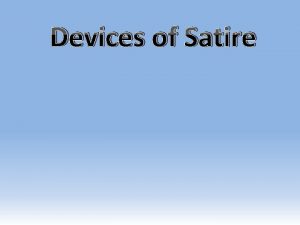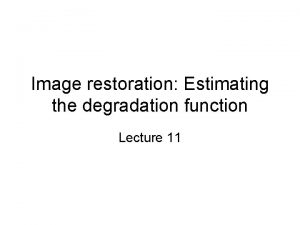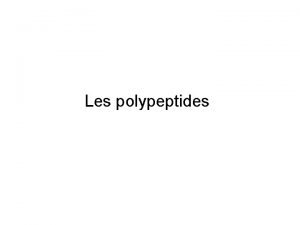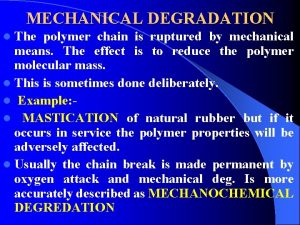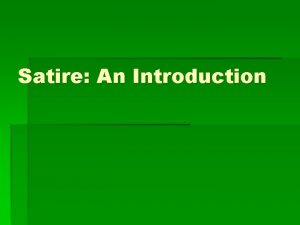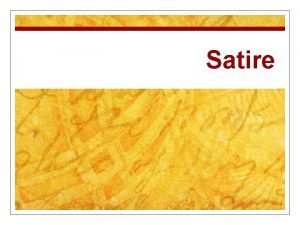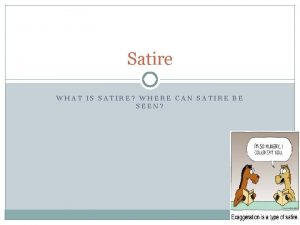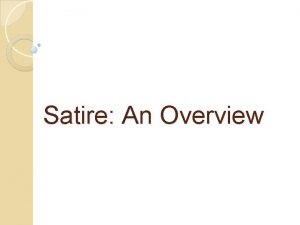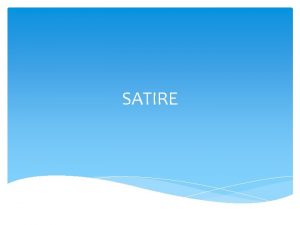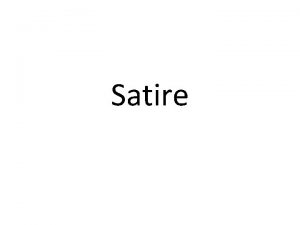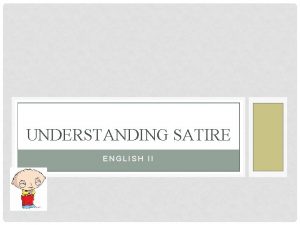Devices of Satire Devices of Satire Reduction Degradation





















- Slides: 21

Devices of Satire

Devices of Satire Reduction – Degradation or devaluation of victim; dehumanization. To belittle the satirical target, reducing power or stature. Caricature - the exaggeration of a physical feature or trait. Political cartoons are a good example of this. Caricature is related to reduction since it makes the target look ridiculous or silly.

Caricature

Devices of Satire Invective – an open, direct insult Paradox/juxtaposition – a contradictory statement Understatement – the opposite of exaggeration. By contrast, it draws attention to the truth.

Invective

Understatement

Devices of Satire Burlesque – A ridiculous, distorted exaggeration. An example is when a character who should use formal, intelligent language speaks like a fool or a character who is portrayed as uneducated uses highly sophisticated, intelligent language.

More on Burlesque A serious subject may be treated frivolously or a frivolous subject seriously. The essential quality that makes for burlesque is the discrepancy between subject matter and style. That is, a style ordinarily dignified may be used for nonsensical matter, or a style very nonsensical may be used to ridicule a weighty subject.

Devices of Satire Reductio ad absurdum – Author appears to agree with attitudes or assumptions he wishes to satirize; by pushing to logically ridiculous extreme, the author exposes the foolishness of the object of the satire. In other words, you adopt the position opposite of what you want to prove and show that it produces a false conclusion.

Devices of Satire Ambiguity – makes satiric comparison sharper by making vague distinction between the target and the object to which it is compared.

Ambiguity

Devices of Satire Zeugma – Listing of things of greatly differing value as if they were of equal value. A word, usually a verb or an adjective, applies to more than one noun, blending together grammatically and logically different ideas. Examples: John lost his coat and his temper. John and his license expired last night.

Zeugma

Devices of Satire Parody - To imitate the techniques and/or style of some person, place, or thing, mimicking the techniques and/or style in order to ridicule the original. For this to be successful, the reader must know the original text that is being ridiculed.

Parody

Devices of Satire Innuendo – Indirect attack; insinuation. Example: “I don’t know what my opponent will base his speech on, but I’m basing mine on love for my country!” (Insinuation is that the opponent may not love his country. )

Devices of Satire Irony – Double meaning (pun); verbal irony and situational irony. Double entendre - a word or phrase open to two interpretations, one of which is usually risqué or indecent.

Double Entendre Examples: “If I Said You Had a Beautiful Body Would You Hold It Against Me? ” – song by the Bellamy Brothers “That’s what she said. ”

Devices of Satire Distortion/defamiliarization – changing the perspective of a situation by isolation or by stressing some parts while deemphasizing others. In other words, taking something out of its ordinary surroundings, sometimes revealing its idiocy or inadequacies – or presenting to audiences common things in an unfamiliar or strange way in order to enhance perception of the familiar.

Distortion

Other Devices of Satire also uses the following: • Real or fake statistics, facts, dialogue • Multiple examples • Figurative language (vivid, shocking, and defamiliarizing) • Consistent tone and diction (satiric) • Concrete detail • Hyperbole
 Satire devices
Satire devices Examples of exaggeration satire in shrek
Examples of exaggeration satire in shrek Light induced degradation
Light induced degradation Linear position invariant degradation
Linear position invariant degradation Estimating the degradation function
Estimating the degradation function How environmental degradation occurs
How environmental degradation occurs Metabolismn
Metabolismn Edman degradation
Edman degradation Edman degradation
Edman degradation Purification table
Purification table Fructose 1 6 bisphosphatase
Fructose 1 6 bisphosphatase Land degradation definition
Land degradation definition How environmental degradation occurs
How environmental degradation occurs Tag degradation
Tag degradation Edman degradation
Edman degradation Prdp biochemistry
Prdp biochemistry Potential induced degradation
Potential induced degradation Noise
Noise Glucose 6 phosphatase
Glucose 6 phosphatase Conclusion of environmental degradation
Conclusion of environmental degradation Mechanical degradation
Mechanical degradation Abnormal degradation of disaccharides
Abnormal degradation of disaccharides
